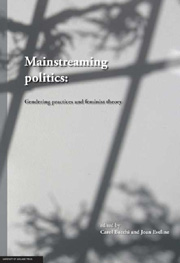Book contents
- Frontmatter
- Contents
- Preface
- Personal reflection
- Publisher's note
- List of authors and project personnel
- Acknowledgements
- Introduction
- 1 Gender/ing impact assessment: Can it be made to work?
- 2 Mainstreaming and neoliberalism: A contested relationship
- 3 Gender analysis and social change: Testing the water
- 4 What are we mainstreaming when we mainstream gender?
- 5 Approaches to gender mainstreaming: What's the problem represented to be?
- 6 Power, resistance and reflexive practice
- 7 Gender mainstreaming: The answer to the gender pay gap?
- 8 Gender analysis and community participation: The role of women's policy units
- 9 The invisibility of gendered power relations in domestic violence policy
- 10 Gender mainstreaming versus diversity mainstreaming: Methodology as emancipatory politics
- 11 University-public sector research collaboration: Mine the space, never mind the gap
- 12 Obeying organisational ‘rules of relevance’: Gender analysis of policy
- 13 Gender mainstreaming or diversity mainstreaming? The politics of ‘doing’
- Conclusion A politics of movement
- Author Index
- General Index
7 - Gender mainstreaming: The answer to the gender pay gap?
Published online by Cambridge University Press: 05 June 2012
- Frontmatter
- Contents
- Preface
- Personal reflection
- Publisher's note
- List of authors and project personnel
- Acknowledgements
- Introduction
- 1 Gender/ing impact assessment: Can it be made to work?
- 2 Mainstreaming and neoliberalism: A contested relationship
- 3 Gender analysis and social change: Testing the water
- 4 What are we mainstreaming when we mainstream gender?
- 5 Approaches to gender mainstreaming: What's the problem represented to be?
- 6 Power, resistance and reflexive practice
- 7 Gender mainstreaming: The answer to the gender pay gap?
- 8 Gender analysis and community participation: The role of women's policy units
- 9 The invisibility of gendered power relations in domestic violence policy
- 10 Gender mainstreaming versus diversity mainstreaming: Methodology as emancipatory politics
- 11 University-public sector research collaboration: Mine the space, never mind the gap
- 12 Obeying organisational ‘rules of relevance’: Gender analysis of policy
- 13 Gender mainstreaming or diversity mainstreaming? The politics of ‘doing’
- Conclusion A politics of movement
- Author Index
- General Index
Summary
Introduction: Joan Eveline and Carol Bacchi
The cross-fertilisation of ideas that is evident in earlier chapters, particularly in Chapters 3 and 4, is also clear in this study, which took place before the Gender Analysis Project actually commenced. We include the chapter here because it explores the question of gender mainstreaming in ways which dovetail with questions we raise in the earlier chapters, including whether gender mainstreaming can ‘transform’ policies and policy development organisations.
In 2004 Patricia Todd and Joan Eveline undertook a public inquiry into the gender pay gap in Western Australia, commissioned by the incumbent Labor Government. This chapter is from that study. It analyses Australian gender pay gap inquiries conducted over the past decade to identify those components with transformative potential in the context of Australian industrial relations regulations and conditions. It provides examples of when and how policymakers have deployed such components, and when they have not.
Interestingly, gender mainstreaming was the policy technique being mooted in only one of those inquiries, a suggestion that indeed has not since been initiated by the government involved. Rather than offering a study of how to close the gender pay gap through gender mainstreaming, therefore, this chapter asks what components we would wish to include if gender mainstreaming were used. Our earlier Chapters 2 and 3 introduced readers to the notion that gender mainstreaming is deeply contested as concept and practice – that it means different things in different locales – and this includes whether and when policymakers use it, how they use it and how they represent ‘the problem’ they hope to deal with (Chapter 5).
- Type
- Chapter
- Information
- Mainstreaming PoliticsGendering Practices and Feminist Theory, pp. 163 - 190Publisher: The University of Adelaide PressPrint publication year: 2010



